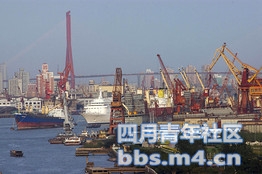|
|
【中文标题】中国人民币将成为最终资金避风港?
【原文标题】China’s Yuan: The Last Safe Haven?
【登载媒体】华尔街日报
【来源地址】http://blogs.wsj.com/marketbeat/2011/09/06/china-the-last-safe-haven/?mod=google_news_blog
【译 者】godstear4u
【翻译方式】人工
【声 明】本翻译供Anti-CNN使用,未经AC或译者许可,不得转载。
【译 文】

Now that the Swiss National Bank has broken out the boiling oil to keep safe-haven seekers out of its currency, are there any truly safe places left to park your cash? Aside from that Mason jar buried in the back yard?
随着瑞士央行投下了将避险资金赶出流通市场的重磅炸弹,除了把钱藏在罐子里埋在后院,投资者现在还有真正安全的存放现金的地方吗?
The Swiss franc is down more than 9% today against the US dollar, in what could be a record one-day decline, after the SNB set a hard peg for its currency. That’s scalding the safe-haven seekers who have scrambled into the franc in recent weeks to avoid trouble in the rest of the world.
今天瑞士法郎兑美元下跌了9%,创下了自瑞士央行将瑞士法郎与美元挂钩以来瑞士法郎的单日下跌记录。这无疑对世界其他地方蜂拥而入瑞士的避险资金雪上加霜。
So where to next? The Japanese yen and the US dollar are typically tops on the safe-haven list, but they have their issues, to say the least. The Norwegian krone is getting a look.
那么接下来该何去何从路在何方?日元和美元无疑是优先选项,但他们自己至少也出了些问题。挪威的克朗倒是还值得考虑(挪威克对欧元上涨)。
But policy makers around the world seem to have embarked on a “beggar thy neighbor” approach to their currencies, fighting tooth and nail to weaken their individual currencies in order to protect their own economies, Rebecca Patterson, chief market strategist at J.P. Morgan Asset Management, tells clients today:
然而全球决策者们似乎都在实行以邻为壑政策,竭尽全力打压内部市场流通性来保护国内的经济。大摩资产管理公司首席市场分析师丽贝卡·帕特森(Rebecca Patterson)今天告诉客户:
In currency markets, “beggar thy neighbor” refers to policies that result in a weaker local currency to help the respective economy via exports, at the expense of foreign currencies and economies. One could argue that a growing number of countries are now marching down this road, Switzerland being the latest. The U.S. and U.K., through quantitative easing in recent years, have weakened their currencies. The Bank of Japan, unilaterally and with help from G-7 peers, has intervened to weaken the yen. Just last week, Brazil abruptly cut interest rates in an effort to weaken the real.
在通货市场,“以邻为壑”指的是降低内部流通性通过出口来促进自己经济恢复却导致国外流动性泛滥经济下滑的政策。有人可能会说现在国家许多都在这样做,瑞士是最新加入的一个。美国和英国,经过这些年的量化宽松已经造成他们自己的货币贬值。日本央行靠自己投放日元和其他G7国家的帮助也已经在干预汇率使日元贬值。就在上周,巴西突然降息使实值贬值。
So where to turn in such a world? Ms. Patterson suggests your options are limited — just two, to be exact. The first is not so surprising. The second option is:
在这样的世界大环境下路在何方?帕特森女士建议不要讲自己的思维局限在常规里——路有两条,除了寻常路还有一条路是:
To the degree investors are looking for liquid, “safe” places to park capital, and central banks make their local currency and bond markets less attractive, gold and other precious metals are likely to keep benefiting. Even at current valuations, the economic backdrop – with “low for forever” developed-market interest rates and beggar-thy-neighbor currency policies, should at least help keep these commodity prices supported.
投资者寻求可流入以存放资本的避风港,而各国央行们却紧缩通货和相关市场,在某种程度上投资金等贵金属可能继续盈利。由于经济大环境下不景气,发达国家采取以邻为壑政策无限期维持低利率,即使按照现在的价格高位,未来价格仍将继续上涨。
As for other currency markets, capital will keep looking for safe homes beyond precious metals. We believe several emerging Asian currencies will remain front and center here, given widespread and often large current account surpluses (outside of India), relatively sound fiscal backdrops and trade and capital-flow ties to China. However, we would not expect these central banks to simply accept their fates as the new Switzerlands of the world, especially given their reliance on exports as well. Indeed, stepped up intervention here, or even shifts in monetary policy could emerge later this year should capital-flow pressures prove too much. The exception may be China. We continue to believe USD/CNY will continue its gradual downtrend, as local policymakers use the yuan to help manage inflation risks and to slowly rebalance the economy towards domestic demand. While less liquid and accessible, the yuan may be the ultimate safe haven today outside of gold.
而在其他国家通货市场中,资本会继续寻找比投资贵金属更好的避风港。我们认为由于新兴亚洲国家将成为其中的焦点,他们有数额巨大的经常项目盈余(除了印度),相对良好的财政状况以及和中国密切的贸易和资本流动。但是我们不能指望这些国家的央行象瑞士一样坐以待毙,尤其考虑到他们对出口的依赖。的确,如果资本流入压力过大,这些地方今年晚些时候将加大汇率干预,甚至可能改变财政政策。但中国可能例外。我们认为美元兑人民币汇率将继续下跌,而那里的政策决策者们将使用人民币来管理控制通胀风险,并扩大内需逐渐使经济趋于平衡。尽管流动性差开放程度低,现在人民币仍可能是除了金以外的终极避险天堂。
|
评分
-
2
查看全部评分
-
|
